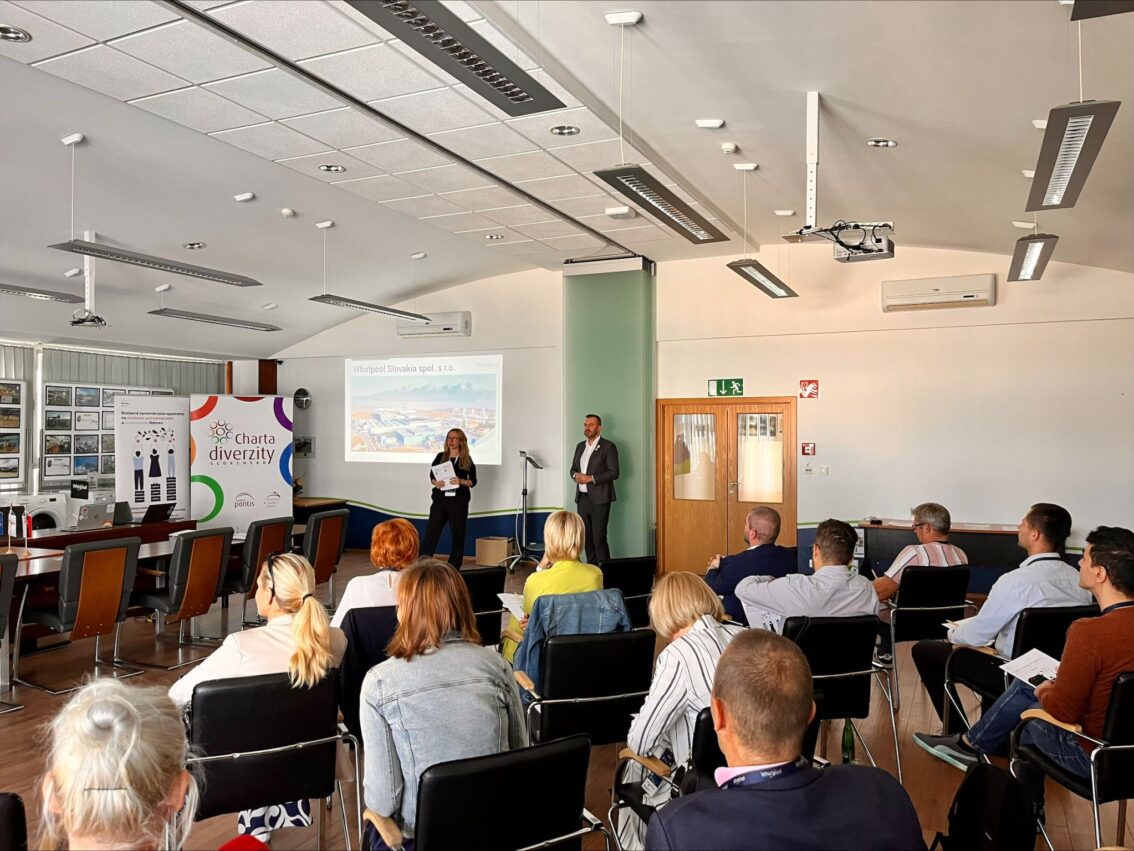The signatories of the Diversity Charter met in Poprad
On Friday, the 29th of September, a regional meeting of the signatories of the Charter of Diversity Slovakia took place in the premises of Whirlpool Slovakia in Poprad. The theme of the work brunch was the implementation of temporary compensatory measures in the employment of disadvantaged groups.
At the beginning of the meeting, the attendees were welcomed by Jaroslav Grygar, senior HR manager and director of Whirlpool Slovakia, who also detailed their inclusive approach to employing people from (not only) marginalised Roma communities. The region where the company operates has the highest unemployment rates, and a significant portion of its population consists of people of Roma origin or other socially disadvantaged groups. “In 2014, we terminated our cooperation with employment agencies and decided to take the recruitment process into our own hands. One of the first measures was to provide employees with proper employment contracts, as this is also a motivation for people from marginalised groups,” said J. Grygar. Currently, members of the Roma community constitute more than a quarter of Whirlpool’s workforce.
The adaptation process facilitates the transition into production
The company built two training and competency centres from its own resources, located directly in the plant area. One, a static centre, is used for the recruitment process and focuses on testing essential skills needed in production, such as screwing, soldering, and carrying weights. While candidates perform various tasks, trainers not only observe their technical execution but also whether they correctly understand the instructions. After being hired, employees go through the second centre, the so-called adaptive centre, where they learn new processes and improve necessary skills over several days. Only then do they move to actual production. “During the adaptation process, we can capture work habits, behaviour, and also reduce human errors, which are a common problem in production,” explained J. Grygar.
Thanks to the centres and training methodology, Whirlpool was able to directly involve more than 60% of employees who had not completed primary or secondary education into the production process immediately after their adaptation, making them a stable part of the workforce. With its inclusive approach, the company managed to reduce staff turnover to under 2%, and overall employee satisfaction increased, reaching 83%. For its activities in this area, the company received the prestigious Via Bona Slovakia award in 2020 and 2023.
Temporary compensatory measures as support for people who need to improve their work habits
At the meeting, practical experiences with the implementation of temporary compensatory measures were also shared by Michaela Mudroňová, the director of the non-profit organisation Labour Agency BBSK and coordinator of employment counseling at the non-profit organisation People in Need, and Zuzana Pavlíčková from the Slovak National Centre for Human Rights.
“Temporary compensatory measures are specific measures aimed at addressing inequalities and disadvantages, based on equal opportunities,” explained Z. Pavlíčková. In practice, these measures can take the form of dual education, scholarship programmes for selected groups of people, preferential employment, internal quotas, or programmes to increase qualifications or supplement education.
Mudroňová primarily encounters people with low skill levels in her practice. “They lack work habits, for many of them, it’s their first contact with legal employment, so they need support. We accompany them in interviews, during their job entry, provide them with training, and also give feedback to employers,” she explained.
Young people without secondary education are also disadvantaged in the labour market
The organisation People in Need has been working with Tesco Stores SR in the field of implementation of temporary compensatory measures for a long time. They recommend their clients, who are preferentially invited to job interviews. Since March of this year, they have managed to place eight people in permanent employment or other various employment agreements in this way.
Another disadvantaged group includes young people who have decided not to continue their high school education. “This group is significantly disadvantaged in the job market because, due to their age, they have various restrictions, such as not being able to work at night. It is not cost-effective for companies to hire such people because they lack skills, and they do not provide any tax benefits,” said M. Mudroňová.
In collaboration with Tesco Stores SR, they have launched a development programme in Malacky. A young person who has completed their compulsory school attendance gradually goes through all the tasks in the store, such as cleaning or stocking shelves. Each of them also has a buddy who accompanies them in the work process. M. Mudroňová admitted that such a programme is not for everyone, and some do leave. However, they also have several positive examples. “We had a girl who finished primary school but decided not to continue. She completed our development programme at Tesco and, based on this experience, later decided to apply to a vocational school for sales,” she said.
People in Need has also had similar collaborations with companies like Volkswagen and Adient. In the near future, they are preparing a sewing course on an industrial machine for Roma women and men. “The temporary equalising measure in this case is that when two identical resumes come to Adient, they give preference to our client because they have already gone through the training centre,” added M. Mudroňová.
As part of the meeting, there was also a tour of the training and competency centres of Whirlpool Slovakia, which are located directly on the factory premises. These centres serve not only in the process of recruiting employees but also for their further training, upskilling, and reskilling.






